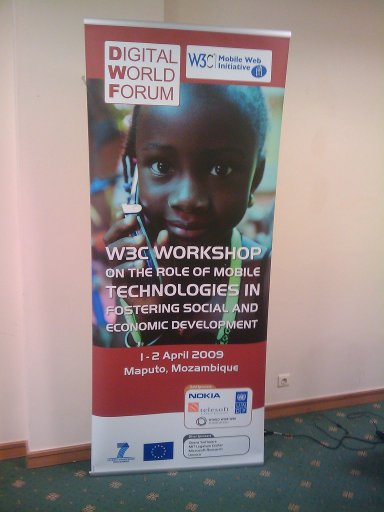
Last week I was in Maputo for the
W3C workshop on the "Africa Perspective on the Role of Mobile Technologies in Fostering Social Development". The aim of the workshop is to understand the specific challenges of using mobile phones and Web technologies to deliver services to underprivileged populations of developing countries, and also to capture the specificities of the African context.
Ushahidi was privileged to have a seat to present. I was in the mobile activism session where I presented with our mutal friend
Frontlinesms, of
Kiwanja.net the software that powers Ushahidi's SMS functionality and with Erik Osiakwan as well who presented Web plus SMS for elections. A software used to collate ghana elections results and its SMS functionality is also powered by frontlinesms. I presented the history of Ushahidi. How it was born out of crisis and the empowerment it gave to ordinary kenyan's to report incidents during the post election crisis and also on the current state of the project, where we have so far delpoyed after its first depoyment and the way forward for us.
There was a session on M-health( Mobile health ) where applications were presented concerning mobile solutions in the health care sector. One interesting application presented by
Josh Nesbit is
Frontlinesms:medics an SMS based communication network. Josh Nesbit the implementer of the solution is a senior in the Human Biology Program at Stanford University, he traveled all the way to St. Gabriel’s Hospital in Namitete, Malawi with recycled cell phones, laptops running Frontlinesms. A voluntered community health workers were called, trained in text messaging and were given cellphones. At the hospital was a computer running frontlinesms which cooordinates the health network activities.
As a result of the SMS communication network, the hospital now responds to requests remote patient care, tracks distant patients and their health related activities, informs community health workers of proper drug dosages and uses and facititates the communications between community health workers. As before the SMS communication set up, all this activities have to be done over 100 miles which is stressful and expensive.I see an Ushahidi instance setup here. If ever the health workers want to track the locations and record extactly where most health related issues happens, they can map the various issues on a map using Ushahidi. I look forward for such an instance set up.

